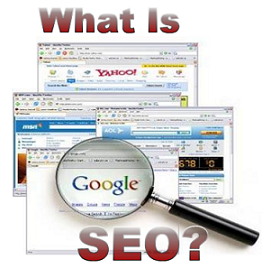 SEO is an acronym for Search Engine Optimization. Search engine optimization is the process of improving the website visibility in the search results of search engines. This process involves various SEO techniques to improve ranking.
SEO is an acronym for Search Engine Optimization. Search engine optimization is the process of improving the website visibility in the search results of search engines. This process involves various SEO techniques to improve ranking.
The need for SEO arises because research shows that most people don’t look beyond the first page of search results, so if you want to create awareness about your brand, then you need to appear at the top of search results.
Effective SEO can help you:
- Broaden awareness in new geographical areas
- Build reputation among customers, employees
- Improve customer service by delivering strong online support
- Increase awareness of product benefits among public
- You can improve the products, by conversing online with the customers via blogs, forums and feedback forms.
How does SEO work?
Search Engines such as Google, Yahoo and Bing index pages on the web with the help of spiders or crawlers. These spiders or crawlers use web pages links and travel from one site to another after the links. When search engines find any new page, then it will crawl its code and transfer it back to its data center. To keep their index fresh, spiders may visit indexed websites daily. Search engines use a formula commonly known as Algorithm to “rate” relevancy of the websites for each search query. The most relevant websites for a particular search query appears at the top of search results.
Some of the major factors contributing in Google algorithms for better ranking in search results are:
- Keyword rich on-page content in the form of paragraphs
- Keywords in description tag
- Number of links on a page
- Keywords in title tag
- The number and quality of the web pages available on the internet that are linking to your site
- Keyword density
Visibility of the website can affected by two basic factors:
- On-page SEO factors
- Off-page SEO factors
On-page SEO factors: On-page factors are those factors which affect visibility of the website on search engines, but it can only found on your website. These factors include:
Content, title of URL, title and Meta descriptions and keyword density. Different search engines place different values on various elements. For instance, what Google carries value for particular element may not equally important for Yahoo?
Off-page SEO factors: off-page factors are those factors which affect t visibility of the website but cannot be found on your website. To find relevancy of your website on the basis of off-page factors, search engine will assess that, what other websites think about your websites. It will depend on the measure and quality of the links which you will receive from other websites.
Search Engine Optimization is extremely a wide topic. Besides this there are no set of particular rules for optimizing the websites for search engines. Due to this online marketers work hard to search or find the loopholes within the search engine algorithms and once they find, they end up with providing UN suitable or irrelevant content to users. To sort out this, search engines update their algorithm constantly, so that they cover up these loopholes and give relevant content to the users.
Kristine Lise an author who is interested in written on SEO/ Internet marketing related topics. She is currently working with SEO Rank Smart, who offers best SEO Packages to its clients you can see her work on her company site.